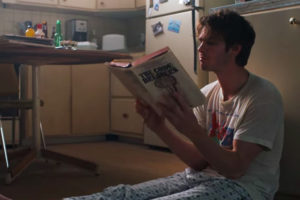 I am sorry to start this review with a personal anecdote, but I’m white and male and we like talking about ourselves, so just bear with me. I, unfortunately, watched this film over two evenings because I wasn’t fortunate enough to live in a city that had a showing of it. And I am getting older which means I fall asleep consistently around 10pm. After watching half of this film and then pausing it to go to bed, I had extremely chaotic dreams and a general restlessness. My mind was working like a frantic machine piecing together the parts of the film I watched into a grand tapestry of Kabbalic numbers and alt-right conspiracies. I am sure some of you have had those dreams where you are on the verge of discovering a significant “deep state” secret, only to wake up in its midst only recalling the experience but none of the evidence. I remember feeling like I was on the verge of some great societal find in my dream, but I don’t remember anything else about it.
I am sorry to start this review with a personal anecdote, but I’m white and male and we like talking about ourselves, so just bear with me. I, unfortunately, watched this film over two evenings because I wasn’t fortunate enough to live in a city that had a showing of it. And I am getting older which means I fall asleep consistently around 10pm. After watching half of this film and then pausing it to go to bed, I had extremely chaotic dreams and a general restlessness. My mind was working like a frantic machine piecing together the parts of the film I watched into a grand tapestry of Kabbalic numbers and alt-right conspiracies. I am sure some of you have had those dreams where you are on the verge of discovering a significant “deep state” secret, only to wake up in its midst only recalling the experience but none of the evidence. I remember feeling like I was on the verge of some great societal find in my dream, but I don’t remember anything else about it.
The following night I finished the film. I slept peacefully from then on. I’m not entirely sure what this has to do with this review except that the film clearly had a significantly psychological effect on me and that the nature of the dream with its evidential dead ends and noir sensibility fits the tone of David Robert Mitchell’s noir satire. Yeah, that’s what I was going for. Definitely.
Before I was able to view the film, I had been concerned about it due to A24’s promotional handling of it and its festival reception. It Follows remains one of my favorite horror films of the new century and The Myth of the American Sleepover was a nice deconstruction of the teen angst films of the 80s. With each date pushback of the film’s release, I became more trepidatious. And, then, it happened: Mark Kermode of the BBC4 Film Review podcast (Wittertainment)—Say hello to Jason Isaacs!—stated, in classic rant mode, that Under the Silver Lake was the new pretentious incarnation of Southland Tales. At that point, I knew I would love this film. I love Richard Kelly. And I still love David Robert Mitchell, I am happy to say.
 What is there to say about this film that Matt Singer didn’t already say in his phenomenal write-up? There is one aspect I would like to add. While I pretty much agree with Singer’s view of the film, I think there is another angle going on in Mitchell’s film. In the midst of the Chinatown-esque intrigue of the film, there is a darker message underneath it that could be seen as mere misogyny by some—and it has!—but is really a critique of that very thing. We are basically seeing the narrative unfold through the eyes of Andrew Garfield’s character, Sam, as he searches through the underbelly of LA in order to find his sexual muse, Sarah. And that’s all she is to him. Another conquest. He doesn’t know her well enough for her to be anything else. If we know that we are in the eyes of this character, then we should recognize the misogyny of his character and view every woman through the eyes of a Jack Black-Shallow Hal character who sees what he wants to see from women. Skimpy clothing, manic pixie-ness, and their unexplainable willingness to interact with him. His gaze is our gaze and that should concern us. Sam is not a deep character and as we dive into the random coincidences and connections he makes, we should know the inevitability of his quest.
What is there to say about this film that Matt Singer didn’t already say in his phenomenal write-up? There is one aspect I would like to add. While I pretty much agree with Singer’s view of the film, I think there is another angle going on in Mitchell’s film. In the midst of the Chinatown-esque intrigue of the film, there is a darker message underneath it that could be seen as mere misogyny by some—and it has!—but is really a critique of that very thing. We are basically seeing the narrative unfold through the eyes of Andrew Garfield’s character, Sam, as he searches through the underbelly of LA in order to find his sexual muse, Sarah. And that’s all she is to him. Another conquest. He doesn’t know her well enough for her to be anything else. If we know that we are in the eyes of this character, then we should recognize the misogyny of his character and view every woman through the eyes of a Jack Black-Shallow Hal character who sees what he wants to see from women. Skimpy clothing, manic pixie-ness, and their unexplainable willingness to interact with him. His gaze is our gaze and that should concern us. Sam is not a deep character and as we dive into the random coincidences and connections he makes, we should know the inevitability of his quest.
 As we travel from cereal box decoders to immortal hit songwriters to underground R.E.M raves and beyond, we witness the truth of Sam’s quest: we will do whatever we can to hide the truth about ourselves from ourselves. Coincidence is often a fancy word for denial, and Sam is in denial about who he really is. He is nothing more than a sex-obsessed, misogynistic, conspiracy theorist who uses anyone and anything he can find to lead himself to the conclusions he predetermines. Hence “coincidences.” Singer pointed this out when he talked about Mitchell writing a character “who would write a barely comprehensible 8,000 word Reddit thread about how the It Follows monster works, and also is maybe a secret metaphor for, like, the Iran-Contra Affair.” Sam is that guy and that guy is perhaps the most toxic of masculinities.
As we travel from cereal box decoders to immortal hit songwriters to underground R.E.M raves and beyond, we witness the truth of Sam’s quest: we will do whatever we can to hide the truth about ourselves from ourselves. Coincidence is often a fancy word for denial, and Sam is in denial about who he really is. He is nothing more than a sex-obsessed, misogynistic, conspiracy theorist who uses anyone and anything he can find to lead himself to the conclusions he predetermines. Hence “coincidences.” Singer pointed this out when he talked about Mitchell writing a character “who would write a barely comprehensible 8,000 word Reddit thread about how the It Follows monster works, and also is maybe a secret metaphor for, like, the Iran-Contra Affair.” Sam is that guy and that guy is perhaps the most toxic of masculinities.
Under the Silver Lake is satire because it grants perspectival reality to the conscious fantasies of the worst of 4chan, Reddit, and Twitter trolls. They aren’t just alt-right, they’re alt-reality. Mitchell is granting them this grand vision, this grand lie, and showing them that at the end of the rainbow is nothing but the truth…about themselves. About ourselves, because as much as we’d like to point out the trolls, the tendency is in all of us to make our own reality in order to feign control over our lives and our fates. Just like J.J. Gittes, Sam does his best investigation and finds that corruption is everywhere and that it undergirds much of society, unlike Gittes, Sam refuses to contend with the truth he finds and instead soothes his conscience with the naked neighbor lady when his sexual muse is taken off the table. He enjoys the comfort and his perceived control in his fantasies instead of dealing with the harder questions of his own corruption.
 The (sad) humor of Under the Silver Lake is that at the end of this remarkable journey through the visually-stunning, quirky, seedy, underbelly of LA, we end where we began. A nameless woman there for the pleasure of Sam, our avatar. It points out the problem with the male-oriented society we live in: we would rather live in the comfort of our own fantastical wonderland of corruptions than to root out the evil in the stonier hearts of men (as Pet Sematary puts it). On top of all of this, the visionary prowess of the narrative and imagery in the film is worth the price of admission alone. The film will probably never get the love it deserves, but that’s okay because those of us who do love it will covet it just like we did with the absurdity of Southland Tales.
The (sad) humor of Under the Silver Lake is that at the end of this remarkable journey through the visually-stunning, quirky, seedy, underbelly of LA, we end where we began. A nameless woman there for the pleasure of Sam, our avatar. It points out the problem with the male-oriented society we live in: we would rather live in the comfort of our own fantastical wonderland of corruptions than to root out the evil in the stonier hearts of men (as Pet Sematary puts it). On top of all of this, the visionary prowess of the narrative and imagery in the film is worth the price of admission alone. The film will probably never get the love it deserves, but that’s okay because those of us who do love it will covet it just like we did with the absurdity of Southland Tales.


